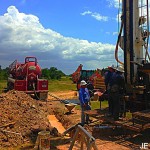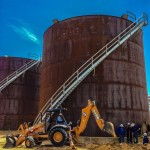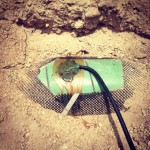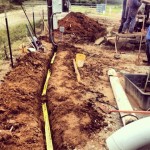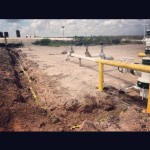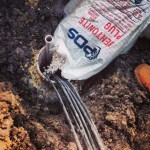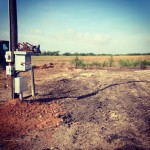About
Cathodic protection (CP) is the process of regulating corrosion of any metal surface by making the metal a cathode of an electrochemical cell. This is accomplished by placing in contact with the metal to be protected an additional, more easily corroding metal to act as the anode of the electrochemical cell. Cathodic protection systems are most commonly used to protect water, oil and gas pipelines, storage tanks, steel piers, offshore oil platforms and onshore oil well casings.
Cathodic Protection Systems
Sacrificial/Galvanic Anode System
The application method of this system involves a piece of more electrochemically “active” metal being attached to the vulnerable metal structure where it is exposed in an electrolyte. Galvanic anodes are selected because they have a more “active” voltage (a more negatively charged potential) than the metal of the target structure (typically steel). For effective cathodic protection, the potential of the steel surface is polarized more negative until the surface has a constant potential. At that stage, the driving force for the corrosion reaction with the protected surface is removed. The galvanic anode continues to corrode; consuming the anode material until eventually it must be replaced. Galvanic or sacrificial anodes are made in various shapes and sizes using alloys of zinc, magnesium and aluminum.
Impressed Current System
For larger structures, or where electrolyte resistivity is high, galvanic anodes cannot economically distribute enough current to deliver protection. In this case, Impressed Current Cathodic Protection (ICCP) systems are used. These systems involve anodes connected to a DC power source, often a transformer-rectifier connected to AC power. In the absence of an AC supply, alternative power sources may be used, such as solar panels, wind power or gas powered thermoelectric generators. Anodes for ICCP systems are available in a variety of shapes and sizes. Common anodes are tubular and solid rod shapes. These include high silicon cast iron, graphite, mixed metal oxide, coated wire among other materials.
Cathodic Protection Services
Engineering
Selecting the best technique for mitigating corrosion of a metal structure is seldom a simple process. Numerous interconnected elements must be considered such as the impact of the immediate environment, the possible for interaction with neighboring facilities, government regulations, time and budget limitations and the practicability of various corrosion mitigation alternatives. Nexus Integrity Management, LLC can offer consultation for all aspects of corrosion-related issues, safeguarding of energy resources, and protection of the environment and integrity of the clients’ infrastructure. Nexus Integrity Management, LLC has National Association of Corrosion Engineers (NACE) certified technicians and engineers. Nexus’ engineering abilities, expert advice and a full range of services make it easy to asses any situation for a client’s cathodic protection needs.
Engineering Services
- Cathodic Protection Design and Testing
- Design and Testing
- Design Evaluations
- Personnel Training
- Coating & Bell Hole Inspections
- Corrosion Studies
- Soil Testing
- Environmental
- Electrical Grounding
- Data Management
- Stray Current
- Corrosion Studies
Installation
Nexus Integrity Management, LLC is a “turnkey” contractor for installation of cathodic protection systems. Nexus has the experience, personnel and equipment necessary to quickly and effectively offer all cathodic protection design and installation project needs. Our NACE certified engineers and technicians work closely with customers to achieve results they need, from simple project oversight to full turnkey design/installation implementation applications. Nexus Integrity Management, LLC has the personnel to deliver extraordinary service and superior workmanship on any project.
Installation Services
- A/C Mitigation Systems
- Deep Anode Groundbed Installation
- Design/ Implementation
- Distributed Groundbed Installation
- Electrical Grounding
- External Tank Base Systems
- Galvanic/ Sacrificial Systems
- Groundbed Abandonment
- Impressed Current Systems
- Internal Tank Systems
- Marine Systems
- Offshore Platforms
- Rectifier Relocation & Repair
- Shallow Groundbed Installation
- Test Station & Monitoring Station Installation (RMU’s)
- Turnkey Operations

